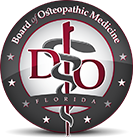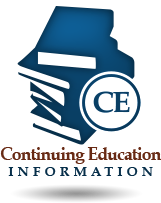Click on the appropriate tab below to see the Initial Licensing Requirements, Process, Fees, Statutes and Administrative Rules for Osteopathic Medicine Full Licensure.
Osteopathic Physicians are often referred to as DOs. They are licensed to practice in all areas of health care that are concerned with the diagnosis, treatment, operation, or prescription for any human disease, pain, injury, deformity, or other physical or mental condition. DOs may prescribe legend and, if holding a valid DEA registration, controlled substance medication. DOs provide indirect supervision to Physician Assistants. ARNPs also practice under a written protocol agreement with a DO.
General Licensure Requirements:
• Graduation from an osteopathic medical school approved by the American Osteopathic Association (AOA).
• Successful completion of an internship or a residency of not less than 12 months in a program accredited by the American Osteopathic Association or the Accreditation Council for Graduate Medical Education. This requirement may be waived for an applicant who matriculated in a college of osteopathic medicine during or before 1948.
• Must pass all three (3) parts of the National Board of Osteopathic Medical Examiners (NBOME) exam within 5 years of application or licensure in another state, or a substantially similar exam approved by the Board. The Board does not consider the USMLE or FLEX exams to be comparable to the NBOME.
• If licensed in another state, have actively and continuously engaged in the practice of osteopathic medicine for the period time after being initially licensed with interruption to practice totaling no more than 2 years (or for a longer period of time if the Board determines that the interruption of the osteopathic physician’s practice has not adversely affected the physician’s present ability and fitness to practice osteopathic medicine).
• Meet all general licensure requirements set forth in 459.0055, F.S. relating to character, age, past discipline, etc.
• File a completed application and pay all required fees. Refer to application instructions for a list of specific documents and information needed.
Examination Requirements and Information:
Anyone applying for licensure must have passed all three parts of the examination conducted by the National Board of Osteopathic Medical Examiners (NBOME) or other substantially similar examination approved by the board.
If you have not taken and passed all three parts of the exam offered by the NBOME, you must demonstrate to the Board that the exam you did pass is substantially similar to all three parts of the NBOME. The board does not consider the FLEX or USMLE exams to be substantially similar to the NBOME as neither of these exams has an osteopathic component or osteopathic philosophies generally incorporated into the questions. If you have taken parts I and II of the NBOME exam you may satisfy part III of the exam by passing the COMVEX exam offered by the NBOME. For more information about the NBOME click here: https://nbome.org/
If you were licensed in another state on the basis of that state’s licensure exam, you may request the Board endorse those exam scores. It is the applicant’s responsibility to demonstrate to the Board that the state licensing exam is substantially similar to all three parts of the NBOME. You will need to request the state Board which administered the exam to send an official copy of your scores and a letter verifying that your license in that state was issued on the basis of the state exam. The more information you can provide regarding the exam, the better the chances the Board can determine the exam to be substantially similar to the NBOME. At the very least, the following information MUST be provided:
1. The number of questions the exam contained;
2. The subjects the exam tested;
3. Who or what entity created the exam;
4. Whether there was an osteopathic component and emphasis;
5. When was the exam administered and endorsed.
Applicants with Health History
If a “Yes” response was provided to any of the questions in this section, provide the following documents directly to the board office:
A letter from a Licensed Health Care Practitioner, who is qualified by skill and training to address the condition identified, which explains the impact the condition may have on the ability to practice the profession with reasonable skill and safety. The letter must specify that the applicant is safe to practice the profession without restrictions or specifically indicate the restrictions that are necessary. Documentation provided must be dated within one year of the application date.
A written self-explanation, identifying the medical condition(s) or occurrence(s); and current status.
Applicants with Disciplinary History
Applicants who have ever been denied licensure, had disciplinary action taken against their license, or have action pending against their license to practice any health care related profession by a licensing authority are required to submit the following documentation to the board:
Self-Explanation – Applicants who have listed disciplinary action on the application must submit a letter in your own words describing the circumstances of the action.
Agency Records – All relevant documentation regarding the action should be sent to the board office by the licensing agency. If the records are not available, you must have a letter on agency letterhead sent from the licensing agency attesting to their unavailability.
Applicants with Criminal History
Any applicant who has ever been found guilty of or pled guilty or no contest/nolo contendere to any charge other than a minor traffic offense must list each offense on the application. Failure to disclose criminal history may result in denial of your application. Each application is reviewed on its own merits.
The Board of Osteopathic Medicine has created guidelines for specific offenses to be cleared in the board office; however, staff cannot make determinations in advance as laws and rules do change over time. Violent crimes and repeat offenders are required to be presented to the Board of Osteopathic Medicine for review. Evidence of rehabilitation is important to the board members when making licensure decisions.
Applicants with prior criminal convictions are required to submit the following documentation to the board:
Self-Explanation – Applicants who have listed offenses on the application must submit a letter in your own words describing the circumstances of the offense.
Final Dispositions/Arrest Records – Final disposition records for offenses can be obtained at the clerk of the court in the arresting jurisdiction. If the records are not available, you must have a letter on court letterhead sent from the clerk of the court attesting to their unavailability.
Completion of Probation/Parole/Sanctions – Probation and financial sanction records for offenses can be obtained at the clerk of the court in the arresting jurisdiction. Parole records for offenses can be obtained from the Department of Corrections or at the clerk of the court in the arresting jurisdiction. If the records are not available, you must have a letter on court letterhead sent from the clerk of the court attesting to their unavailability.
Health Care Fraud, Disqualification for Licensure, Certificate, or Registration
Effective July 1, 2012, Section 456.0635, Florida Statutes (F.S.), provides that health care boards or the department shall refuse to issue a license, certificate or registration and shall refuse to admit a candidate for examination if the applicant:
- Has been convicted of, or entered a plea of guilty or nolo contendere to, regardless of adjudication, a felony under Chapter 409, F.S., (relating to social and economic assistance), Chapter 817, F.S., (relating to fraudulent practices), Chapter 893, F.S., (relating to drug abuse prevention and control) or a similar felony offense(s) in another state or jurisdiction unless the candidate or applicant has successfully completed a drug court program for that felony and provides proof that the plea has been withdrawn or the charges have been dismissed. Any such conviction or plea shall exclude the applicant or candidate from licensure, examination, certification, or registration, unless the sentence and any subsequent period of probation for such conviction or plea ended:
- For the felonies of the first or second degree, more than 15 years from the date of the plea, sentence and completion of any subsequent probation;
- For the felonies of the third degree, more than 10 years from the date of the plea, sentence and completion of any subsequent probation;
- For the felonies of the third degree under section 893.13(6)(a), F.S., more than five years from the date of the plea, sentence and completion of any subsequent probation;
- Has been convicted of, or entered a plea of guilty or nolo contendere to, regardless of adjudication, a felony under 21 U.S.C. ss. 801-970 (relating to controlled substances) or 42 U.S.C. ss. 1395-1396 (relating to public health, welfare, Medicare and Medicaid issues), unless the sentence and any subsequent period of probation for such conviction or pleas ended more than 15 years prior to the date of the application;
- Has been terminated for cause from the Florida Medicaid program pursuant to section 409.913, F.S., unless the candidate or applicant has been in good standing with the Florida Medicaid program for the most recent five years;
- Has been terminated for cause, pursuant to the appeals procedures established by the state or Federal Government, from any other state Medicaid program, unless the candidate or applicant has been in good standing with a state Medicaid program for the most recent five years and the termination occurred at least 20 years before the date of the application;
- Is currently listed on the United States Department of Health and Human Services Office of Inspector General’s List of Excluded Individuals and Entities.
Section 456.013(1)(a), Florida Statutes, provides that a licensure application and fee are valid for one year. Application fees are non-refundable.
The licensing process involves the collection of credentials from the applicant and other sources, such as hospitals, medical schools, other states, etc. Once documents are received, an application specialist will review them; however, it may be necessary for the application specialist to request additional information or clarification regarding a particular document. Our goal is to review materials as quickly as possible, but we must be thorough. We process applications, mail, e-mails, and telephone calls in date order.
You should expect the entire process to take between two to six months from the time your application is received. This timeframe is approximate and is based on the length of time it takes for outside entities (hospitals, schools, etc.) to provide us with the required items. You can help expedite the application process by requesting sources submit documents in a timely fashion.
Staff will mail you a deficiency letter approximately two weeks after receiving your application, so please refrain from contacting our office until after you have received your initial deficiency letter. This letter will include a login and password for you to use our on-line application status check feature. Documents for your file are reviewed and the system updated daily, so please utilize this tool when possible as time spent on the telephone impacts time available for staff to process applications.
Some applicants may have to appear before the Board at one of their regularly scheduled meetings before a license can be issued. Reasons for an appearance include previous disciplinary action in another state, malpractice, criminal history, health history and other application deficiencies. Having one of these issues is not an automatic appearance as each application is reviewed on a case by case basis. You will be notified in writing if your appearance will be required.
We recommend that you do not make any commitments based upon expectation of licensure until you are actually licensed. One application is not accelerated at the expense of another- all applicants are handled equally and fairly.
| Application Fee: | $200.00(non-refundable) |
| Initial Licensure Fee: | $305.00 (includes a $5.00 unlicensed activity fee) |
| NICA Fee: | $250.00 or $5,000.00 (please refer to www.nica.com to determine which amount applies to you) Note- some applicants are exempt from this fee. Please visit www.nica.com to determine if you qualify for an exemption. |
| Dispensing Practitioner Fee: | $100.00 (this fee is optional and allows the physician to sell/dispense certain drugs from their office) |
| Background Check Fee: | this fee is paid directly to a Live Scan provider |
Please make certified checks or money orders payable to: “Department of Health” or “DOH”. Applicants applying on-line may pay by credit or debit card.
Florida Statutes
You will be connected to the Florida Legislature website, which is the official custodian of the statutes.
Chapter 459: Osteopathic Medicine
Chapter 456: Health Professions and Occupations: General Provisions
Chapter 120: Administrative Procedure Act
Florida Administrative Code (F.A.C.)
You will be connected to the Florida Department of State: State Library and Archives of Florida website, which is the official custodian of the administrative codes.
Rules: Chapter 64B15: Board of Osteopathic Medicine
Rules: Chapter 64B: Division of Medical Quality Assurance





